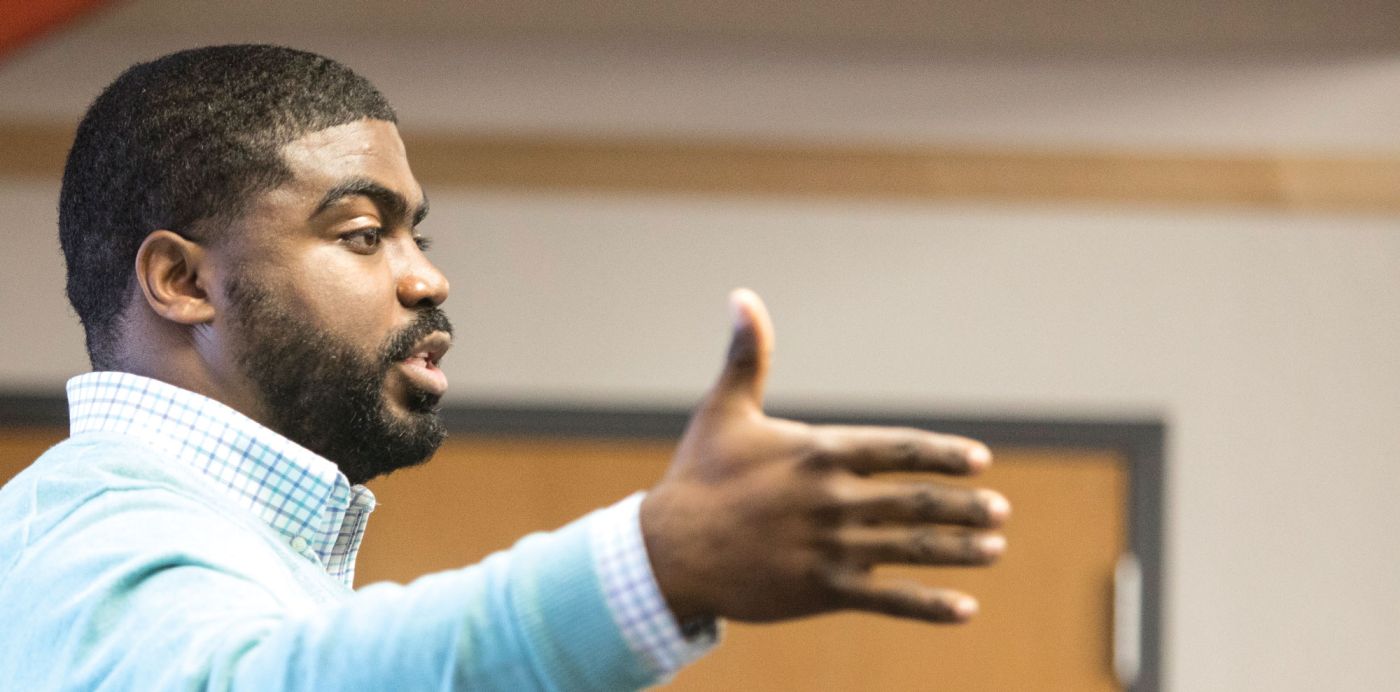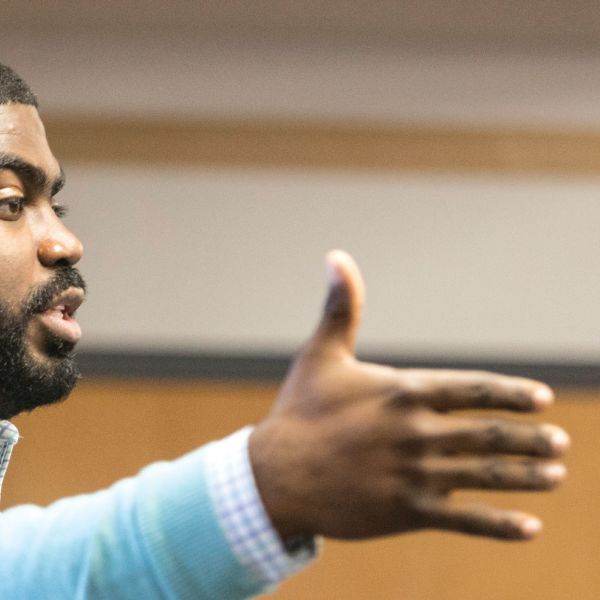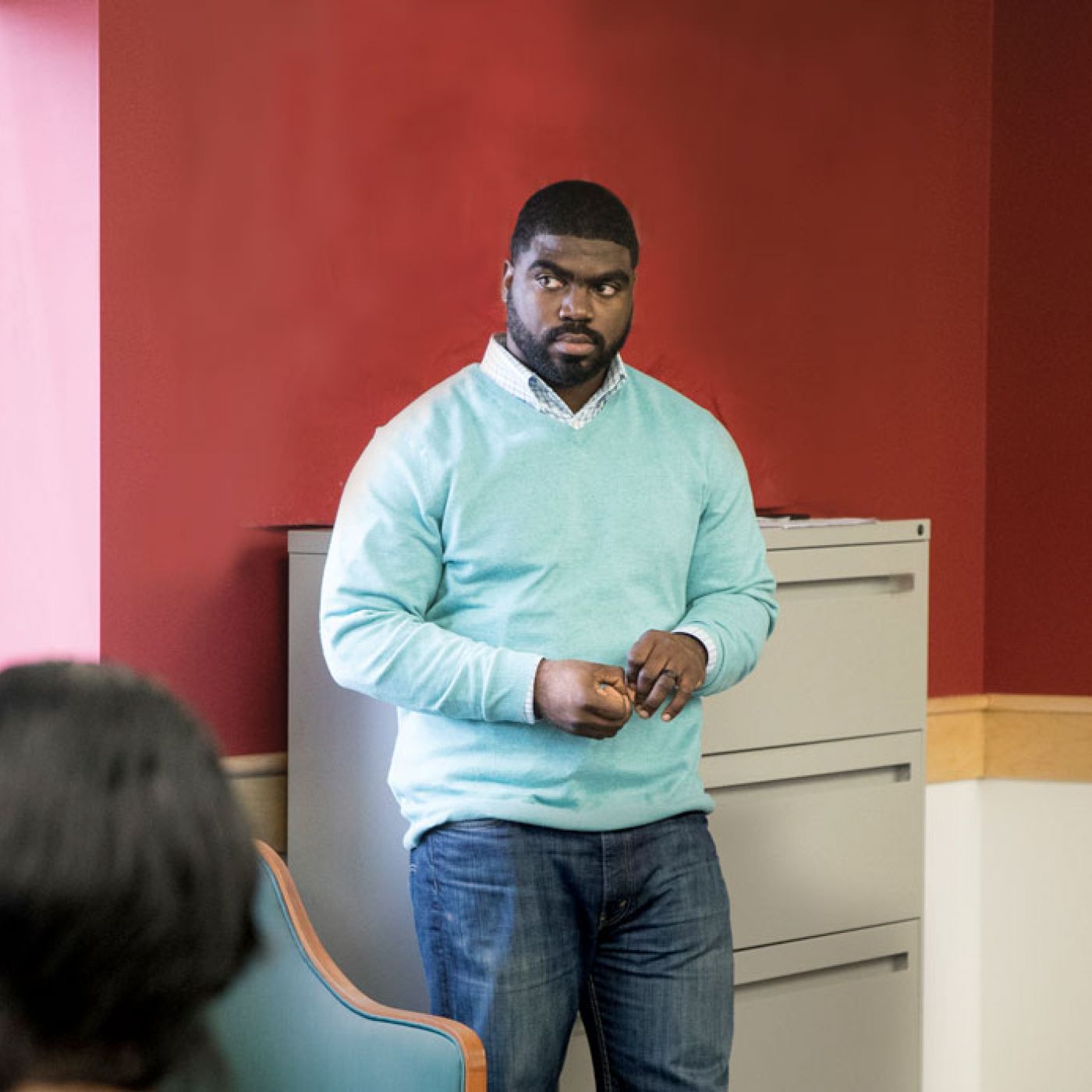When Minneapolis North High School student Brian Cole was killed in 2006, it marked the beginning of a summer plagued by gun violence that took the lives of nearly 15 other teenagers across the city.
At that time, Jesse Ross worked as the associate area director for the Minneapolis branch of Young Life, and many of the victims were kids he saw on a regular basis. Cole, an innocent bystander, was killed in a drive-by gang shooting when the bullet that hit him in the arm traveled up to his neck.
“To have a kid like Brian get shot and killed over some senseless violence just hurts. Those kids live with me,” says Ross, a father of two. “I remember their birthdays and their houses when I drive by on the commute. I can never forget that stuff.”
Now as a Ron McKinley Philanthropy Fellow, Ross works as a policy associate with The Minneapolis Foundation and leads efforts to prevent youth violence. Every day he draws from his experience as someone who grew up, worked in and still lives in north Minneapolis to inform his work.
Yet Ross isn’t exactly the person you’d typically expect to see in philanthropy: He doesn’t have policy experience, he has never worked at a foundation and he’s African American, but that’s exactly the point. Philanthropic leaders in Minnesota have long recognized the field lacks diversity, especially when it comes to leaders of color and Native leaders.
In an effort to change this, the Bush Foundation and the Minnesota Council on Foundations (MCF) launched the Ron McKinley Philanthropy Fellowship in 2013 and introduced its first cohort of Fellows the following year.
“If we have the same set of people with the same set of identities, perspectives and ideas who are making decisions, we might not be making decisions that lift entire communities,” says Alfonso Wenker, the vice president at MCF who helped design the fellowship.
Injecting New Voices
The program places Fellows in full-time positions at participating host foundation sites. Fellows learn how to do the work, and are instrumental in bringing projects to fruition across the Twin Cities and in greater Minnesota. Injecting new voices into an organization gives emerging leaders job experience that will be crucial to their future success. It also infuses fresh ideas, perspectives and experiences into the field. In short, Fellows like Ross make the work better when they show up.
“When I was on the ground, I was directly involved with young people who were shot, doing the shooting, locked up in the system or wanting something better,” says Ross. “I have family in that life, but somehow I made it out. It’s my responsibility to figure out how to help.”
"[If] philanthropy is an important lever of change, then we need more people from more communities who know how to pull that lever."
Alfonso Wenker
Redesigning The System
Long before Jen Ford Reedy took the reins as president at the Bush Foundation in 2012, she worked as a program officer in a rotating position set aside for graduate students at Chicago’s Field Foundation. That experience introduced her to the local community and to the world of philanthropy. She decided that if she ever ran a foundation, she would find a way to create a similar experience for emerging leaders.
Prior to joining the Bush Foundation, Reedy was a strategy consultant at McKinsey and a senior executive at Minnesota Philanthropy Partners. This experience helped her understand how low staff turnover and insulated networks made it hard for new people to break into the system — especially leaders of color and Native leaders. To design the fellowship program, she hired the exact person she hoped it would attract: Wenker.
“I had this reputation in philanthropy as being a young, gay person of color who was constantly asking questions about who was involved and why,” recalls Wenker, who first met Reedy when he worked on the Minnesotans United for All Families campaign.
In 2013, the Bush Foundation officially hired Wenker to develop a fellowship program that would usher leaders of color and Native leaders into the field. To make headway toward a solution, Wenker knew he needed to disrupt traditional networks by placing Fellows directly into the structure of an organization with full-time jobs.
“If we adhere to the assumption that philanthropy is an important lever of change, then we need more people from more communities who know how to pull that lever,” says Wenker. “When we do, they will be able to inform what change looks like, how decisions are made, how partnerships are built and how resources are deployed.”
Halfway through 2013, the Bush Foundation put out a call to find its first round of applicants. Wenker planned to hire a cohort of four Fellows to work in various roles within the Foundation itself. However as word spread about the program, Wenker found his work hit a nerve with several foundations that were asking similar questions.
As the potential of the fellowship program expanded beyond the Foundation, Reedy and Wenker knew the program would gain even greater traction by working with MCF and its new president, Trista Harris (BF'15), who shared the same ambition to diversify the individuals working in philanthropy. As the first round of Fellows kicked off their inaugural year in January 2014, Wenker joined MCF as a staff member to manage the program there.
“In talking with Trista, it became clear that [MCF’s] strategy was no longer going to be to point at the disparity in our field, but to do something about it,” says Wenker.
While most fellowships only last a year or two, the McKinley Fellowship lasts three years. Wenker felt three years gave Fellows enough time to build a substantive portfolio of work.
Throughout their experience, Fellows work with career coaches, meet together monthly, learn about grant making processes and receive a yearly budget to invest in their own professional development. After all, it’s not just about infusing new energy into the field, but about equipping a new crop of leaders with the tools, resources and networks they need to find success.
By 2016, the number of Fellows and alumni grew — from four to 16 — and the program now has eight foundation hosts that provide full-time staff jobs for Fellows.
“The greater the diversity is around your table, the better your decisions are likely to be. That’s true no matter what you do,” says Reedy, whose foundation has worked with 11 Fellows. “However when the decisions you’re trying to make are about positive community change, the more diverse life and community experience you have in the room when making a decision really matters.”
Writing A New Conversation
Picking up the phone, Jesse Ross dialed his brother’s number. While Ross spent the past decade working with youth-based nonprofits, his younger brother took a different path toward a life of gang violence. Despite their differences, Ross still calls his brother for advice.
“Although I may not agree with his lifestyle, I can’t stop my work because he’s the person I think about when I’m trying to figure out, ‘Does this program work?’” says Ross, who went to Minneapolis’ DeLaSalle High School. “I’m not just analyzing this work from a systems view. I’m from Minneapolis. I’ve lived it. Only when I find something that would get my little brother out, do I know we have something that could work.”
Ross joined The Minneapolis Foundation as a McKinley Fellow in 2016, and within his first year became the lead on president R. T. Rybak’s special interest project focused on youth violence prevention. As an African American male who grew up in Minneapolis’ north side, Ross brings real-life experience and expertise to the new undertaking. For Catherine Gray, the manager of the McKinley Fellowship program at the Minneapolis Foundation, that kind of inclusion is the hallmark of good philanthropy.
“We are sitting at a time where we have the opportunity, and increasingly the will, to be able to address some of the challenges to make this place a better place for everyone to live,” says Gray, the director of impact strategy in civic engagement at The Minneapolis Foundation. “For that to happen, it’s all hands on deck. You don’t have a few people making this a better place to live for everyone. You have everyone involved in mapping that out and holding ourselves accountable.”
Ross is the second Fellow to work at The Minneapolis Foundation. During the Fellowship, Gray guides Ross through a three-year commitment that prepares him for a role in philanthropy, or to take the next step in his career, whatever that may be. Beyond equipping individual leaders, though, Gray sees an even wider ripple of success that stems from the Fellowship.
Since its inception, eight host sites have signed on for the program in an effort to diversify talent in their organizations. Those commitments triggered a wider conversation in philanthropy throughout the state. Foundations can no longer claim they lack qualified candidates of color and Native candidates in job searches when the Fellowship represents a tangible solution to that problem.
The evolving dialogue and work in Minnesota serves as a framework that drives the philanthropic sector forward in communities outside of the state, too.
When the Seattle-based organization, Philanthropy Northwest, wanted to explore diversity, inclusion and equity, it looked to the Ron McKinley Philanthropy Fellowship. In 2015, it launched its own near-replica version of the program called the Momentum Fellowship.
The partners behind the Ron McKinley Philanthropy Fellowship lead by example. As they continue to do that and expand their reach throughout Minnesota, Gray can only imagine what the landscape of philanthropy leadership will look like in the future.
“This program is challenging philanthropy and giving it an opportunity to recalibrate the system,” says Gray. “I see an openness and willingness to look in the mirror and say, ‘What can we do better?’”
RON MCKINLEY PHILANTHROPY FELLOWS
Bilal Alkatout
Started: 2015
Fellowship role: Community Innovation Associate at the Bush Foundation
Carly Bad Heart Bull*
Started: 2014
Fellowship role: Education Associate at the Bush Foundation
Currently: Native Nations Activities Manager at the Bush Foundation
Kristell Caballero Saucedo
Started: 2017
Fellowship role: Community Innovation Associate at the Bush Foundation
Saroeun Earm
Started: 2016
Fellowship role: Leadership Programs Associate at the Bush Foundation
Violeta Hernandez Espinosa*
Started: 2016
Fellowship role: Program Associate at the Blandin Foundation
Currently: Legislation and Policy Liaison at the Minnesota Council on Latino Affairs
Venessa Fuentes*
Started: 2014
Fellowship role: Community Innovation Associate at the Bush Foundation
Currently: Communications Program Manager at the Bush Foundation
Takara Henegar
Started: 2016
Fellowship role: Program Associate at The St. Paul Foundation
Aya Johnson
Started: 2015
Fellowship role: Community Innovation Associate at the Bush Foundation
Allison Johnson Heist
Started: 2015
Fellowship role: Giving Project Associate at Headwaters Foundation for Justice
Naaima Khan
Started: 2015
Fellowship role: Community Innovation Associate at the Bush Foundation
Lulete Mola
Started: 2016
Fellowship role: Policy and Community Engagement Manager at Greater Twin Cities United Way
Awale Osman
Started: 2017
Fellowship role: Community Innovation Associate at the Bush Foundation
Patrice Relerford*
Started: 2015
Fellowship role: Policy and Civic Engagement Associate at The Minneapolis Foundation
Currently: Director of Impact Strategy in Education at The Minneapolis Foundation
Jesse Ross
Started: 2016
Fellowship role: Policy and Civic Engagement Associate at The Minneapolis Foundation
Dameun Strange*
Started: 2014
Fellowship role: Community Innovation Associate at the Bush Foundation
Currently: Executive Director at the Northeast Minneapolis Arts Association
Bruce Thao
Started: 2016 Fellowship role: Program Associate at the F.R. Bigelow Foundation
Katie Troyer
Started: 2016
Fellowship role: Employee Engagement Associate at Medtronic Philanthropy
Avi Viswanathan*
Started: 2015
Fellowship role: Community Innovation Associate at the Bush Foundation
Currently: Program Director at Nexus Community Partners Institute for Community Engagement
Coya White Hat Artichoker*
Started: 2014
Fellowship role: Community Innovation Associate at the Bush Foundation
Currently: Consultant
Chao Yang
Started: 2016
Fellowship role: Community Engagement Associate at Medtronic Philanthropy
*Alumni








